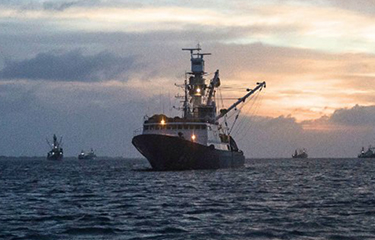World Bank financing project to fight IUU fishing in Pacific Ocean

The World Bank has announced USD 9 million (EUR 8.1 million) in funding for a program devoted to fighting against illegal, unreported, and unregistered (IUU) fishing in the Pacific Ocean.
The funding will go to further the objectives of the Pacific Islands Regional Oceanscape Program (PROP), a regional collaboration supporting the Forum Fisheries Agency (FFA) in its work on fisheries management in the region. The FFA is an organization representing 17 Pacific Island member countries in the Pacific established to help said countries manage fisheries resources within their respective exclusive economic zones (EEZs).
According to the World Bank, the new funding will help the FFA strengthen surveillance and enforcement of regulations across the region’s maritime borders.
“Fisheries are vital to the economies of Pacific countries, and in six FFA member countries are the source of more than 40 percent of government revenue,” Pacific Islands FFA Director General Manu Tupou-Roosen said in a release. “We are so pleased to continue this important partnership with the World Bank to support FFA’s efforts to strengthen monitoring and reporting tools, as well as to model and forecast economic and social impacts of developments in the Pacific fisheries sector.”
The new project will work with the key regional fisheries management bodies to improve regional and national monitoring, control, and surveillance activities to reduce IUU. According to World Bank, it will immediately help improve the capacity and working conditions for national fisheries officials in Pacific Island nations.
The World Bank, which works to alleviate global poverty, said the growing economic power and importance of tuna fishing in the Pacific Islands is a key method for helping citizens of the 17 countries that are part of the FFA.
“Revenue from access fees paid by fishing vessels to Pacific countries has more than doubled over past decade,” World Bank Country Director for the Pacific Islands and Papua New Guinea Stephen Ndegwa said. “This increase was achieved not through increased catch, but an increased rate of return. This additional revenue ultimately means Pacific governments are in a better position to support their citizens’ needs, such as better education, improved healthcare, and more resilient infrastructure.”
As fisheries become an increasingly important economic engine, there also needs to be a focus on ensuring they are sustainable, Ndegwa said.
“There is no room for complacency as the overall mass of most tuna stocks is declining and illegal, unreported, and unregulated fishing is estimated to amount to a value of USD 333.49 million [EUR 303 million] annuall,y or around 6.5 percent of total fish catch in the area,” Ndegwa said.
In addition to helping the FFA fight IUU, the World Bank will also support the organization in finding new low-carbon solutions for upgrading infrastructure.
Photo courtesy of the World Bank






Share